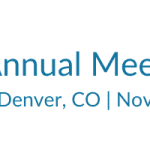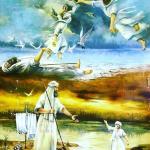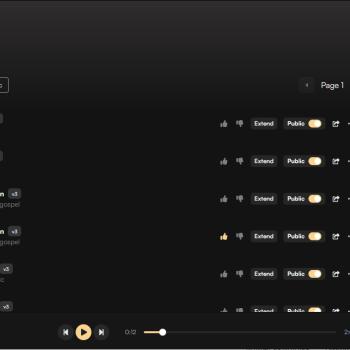Laurențiu Ganea is a Romanian composer whose work was pointed out to me by a fellow New Testament scholar, and whose musical exploration of biblical texts should be of interest to those who (like me) are fascinated by this intersection. Below are a couple of examples of his works. Let me preface them by offering an English translation of an excerpt from an article which features comments by the composer about his setting of the Song of Songs, including his interest in using only instruments mentioned in the Bible. Laurențiu Ganea said (my translation):
I said that I want to respect the original text, even though I had no knowledge of Hebrew. I took it slowly and since 2009, a work that I imagined would take around 6-7 months instead took years to finish. It was performed in London, preceded by a presentation by me. After the conference I performed the music with local musicians from London. When I conceived of the piece, I thought it best to stick as closely as possible to their tradition. I chose instruments mentioned in the Bible or at the least very similar ones: flute, clarinet, bassoon, harp, and percussion as well as tenor and soprano voice. At the same time I tried to preserve and mirror, in a way, the sound of traditional synagogue chant…combined with regional folkloric elements. I succeeded, because I had positive feedback from specialists. I also performed it in Bucharest in the Choral Temple, which was completely full. Most in attendance were Christians. It is a work that belongs to our universal human heritage. It is a work that also raises a question mark for many. What is a love story doing in the Bible?
Another article:
https://uzp.org.ro/11/08/2021/premiera-cantarea-cantarilor-shir-hashirim/
Here is Ganea’s setting of Song of Songs:
Below is a movement from the Trilogy of Righteous Job the title of which is ,,Καθρέπτης και Θεοδικία” – ,,Oglindă și Teodicee” pentru pian și orchestră (which in English is “Mirror and Theodicy” for piano and orchestra):
For those of you who speak Romanian this interview will also be of interest:
Of related interest, the Amateur Exegete shared three of his favorite musical interpretations of Psalm 23.
Mary Montgomery Koppel’s setting of Psalm 13, commissioned by Del Case’s Deus Ex Musica project, is powerful. There is discussion and a pdf of the score on the Calvin Institute of Christian Worship website.
A book review in New Humanist includes this:
Of the book’s germ, Ignatieff recalled a choral performance of the Psalms staged in Utrecht. “I began to wonder why a non-believer like me would be moved and comforted and possibly consoled by religious language,” he said. “That sent me to look at the Psalms in detail, and the Hebrew Bible, and Saint Paul, and on and on.”
New open access article by Diederik Blankesteijn, “Singing for a King: The Message of Psalm 45” in the Journal of Hebrew Scriptures
Wil Gafney on Ash Wednesday and Psalm 51
Delitzsch on Translations of the Psalms and on the te-amim
Meaning in the margins of the Theodore Psalter
Eddie Arthur had two posts on lament and the Psalms:
Jill Firth reviews Praying the Psalms
An exploration of the nativity story that has the magi and shepherds collaborate: Gabriel Pierné, Les enfants à Bethléem.
Bob MacDonald has been blogging through Delitzsch on the Psalms:
History of Composition of the Psalms
The Strophe-System of the Psalms (continued)
the so-called parallelismus membrorum
Delitzsch: presentation on music in the church, and music he was familiar with (continued)
Theology and the Psalms: Preliminaries
Comparing Delitzsch and Eusebius
On Fanny Crosby:
https://www.episcopalcafe.com/2fab-fanny-crosby/?utm_source=feedly&utm_medium=rss&utm_campaign=2fab-fanny-crosby
Channah Fonseca Becar on the Bible and death metal in The Conversation
Still eager for more music? How’s this for an example of neglected biblically-related music?













